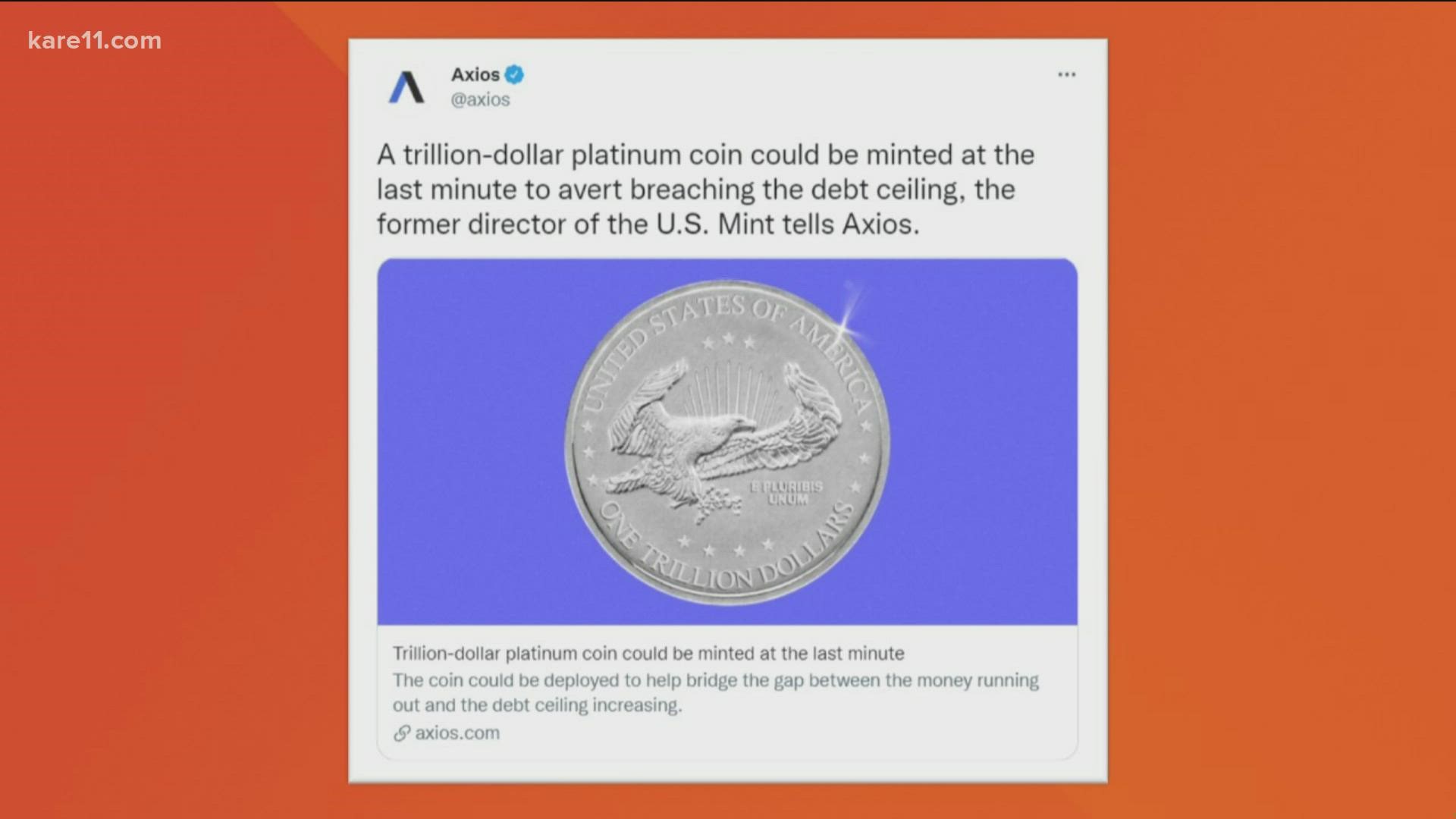WASHINGTON — As Democrats and Republicans face off over the debt ceiling deadline, some on social media are calling on President Biden to take drastic action to resolve the crisis on his own.
According to various social media posts, the Treasury can mint a $1 trillion coin made out of platinum, in order to cover past spending and avoid needing to raise the debt limit.
But is this true? Let's Verify.
QUESTION:
Can the Treasury simply mint a platinum coin worth $1 trillion, to avoid a debt ceiling crisis?
SOURCES:
- Thomas Kahn, Faculty Fellow and Adjunct Professorial Lecturer at Department of Government at American University
- Dean Baker, Senior Economist at the Center For Economic And Policy Research
- David Wessel, Director of The Hutchins Center on Fiscal And Monetary Policy at Brookings Institution
- Michael N. Castle, Former Governor of Delaware (1985 - 1992), Representative in Congress (1993-2011)
- U.S. Code, Title 31 - "Denominations, Specifications, and Design of Coins"
- HR 2614, "Commemorative Coin Authorization and Reform Act of 1995"
- Public Law 104-208, Omnibus Appropriations Bill of 1997
ANSWER:
Yes. Due to an obscure law passed in the 1990s, the Treasury is allowed to mint platinum coins of any denomination. During the previous debt ceiling crisis of 2011, the idea gained widespread attention and even some support from politicians and economists.
WHAT WE KNOW:
The idea of creating a $1 trillion platinum coin to avoid the debt ceiling, has been tossed around for more than a decade. Facing another deadline, the out-of-the-box idea is back.
On social media, people have started using #MintTheCoin, to call on the Treasury to take this drastic action. It's received the support of some economists, such as Paul Krug, who wrote an op-ed on the subject.
It also prompted the Internet memes and posts, as people imagined what a $1 trillion coin might look like.
The Verify team reached out to various financial and policy experts, to break down whether this farfetched idea is actually possible. The team also looked through the U.S. code.
Title 31 of the U.S. Code outlines why this massive $1 trillion coin would be possible. Section K reads as follows:
"The Secretary may mint and issue platinum bullion coins and proof platinum coins in accordance with such specifications, designs, varieties, quantities, denominations, and inscriptions as the Secretary, in the Secretary’s discretion, may prescribe from time to time."
This section of the code opens the door for the Secretary to mint a new platinum coin to cover past spending and to avoid needing to go into further debt.
"They can in principle mint a platinum coin and assign some huge value to it," said Dean Baker from the Center For Economic and Policy Research. "So they could say here's a new platinum coin - it's worth a trillion dollars - and then they could sell it to the FED, and say give us a trillion dollars that don't count as debt."
David Wessel from the Brookings Institution said that this is a "gimmick," a "fantasy," and a "distraction" from real solutions.
"I think it would make us look like a Banana Republic," he said.
The obscure line of the U.S. Code has its origins in a law proposed in the 1990s, "The Commemorative Coin Authorization and Reform Act of 1995." This bill was eventually incorporated into an appropriations law in 1997.
This bill was sponsored by former Rep. Michael Castle from Delaware, who also previously served as the governor in that state. He said the bill was meant to help collectors get ahold of new platinum coins, and make the federal government a little money as a result.
"The bottom line is that they were solely for the purpose of being relatively low cost," he said. "So individuals could be able to collect them."
Castle said he definitely does not support the idea of minting a platinum coin to solve the debt ceiling crisis.
"I have already condemned this," he said.
As some lawmakers economists start to float the idea once again, most remain vocally against such a move.
"It will be a message to the markets," said Thomas Kahn from American University. "That we are totally out of control. That Congress can not deal with these problems."
Janet Yellen, the Secretary of the Treasury, called the move a "gimmick," and said she did not support minting a $1 trillion coin.

